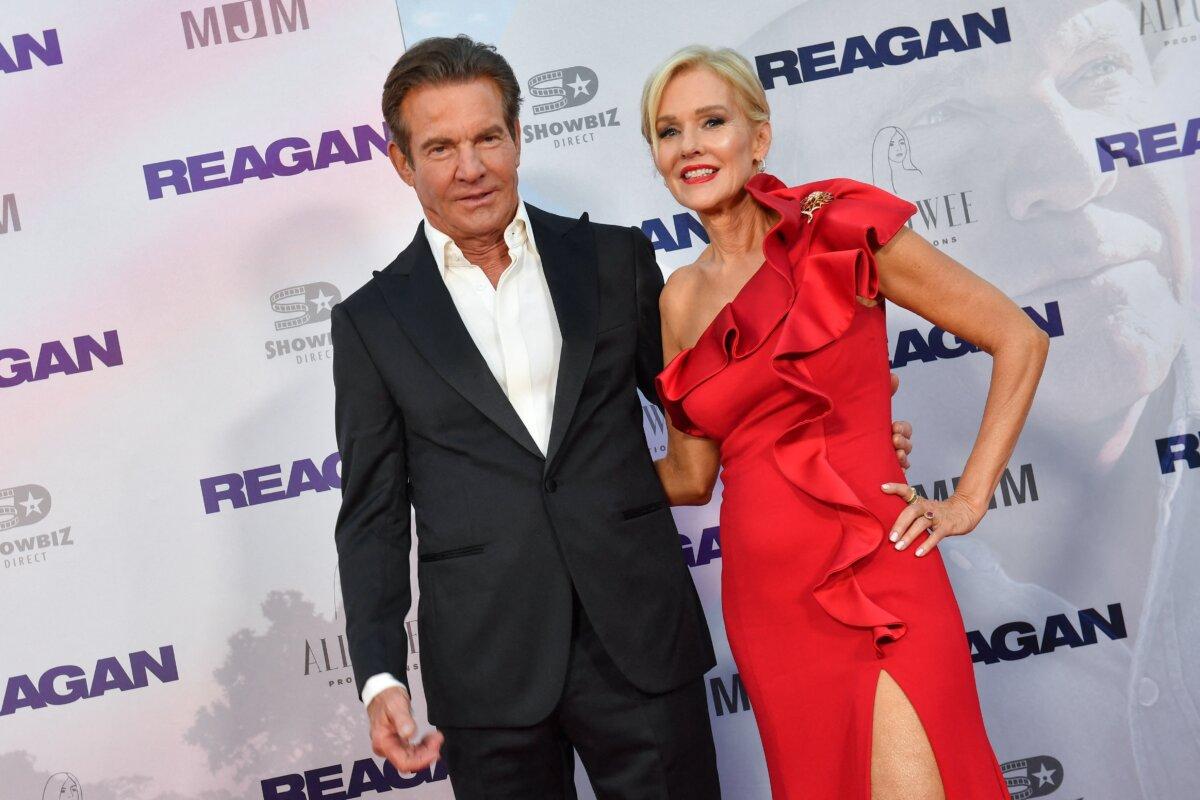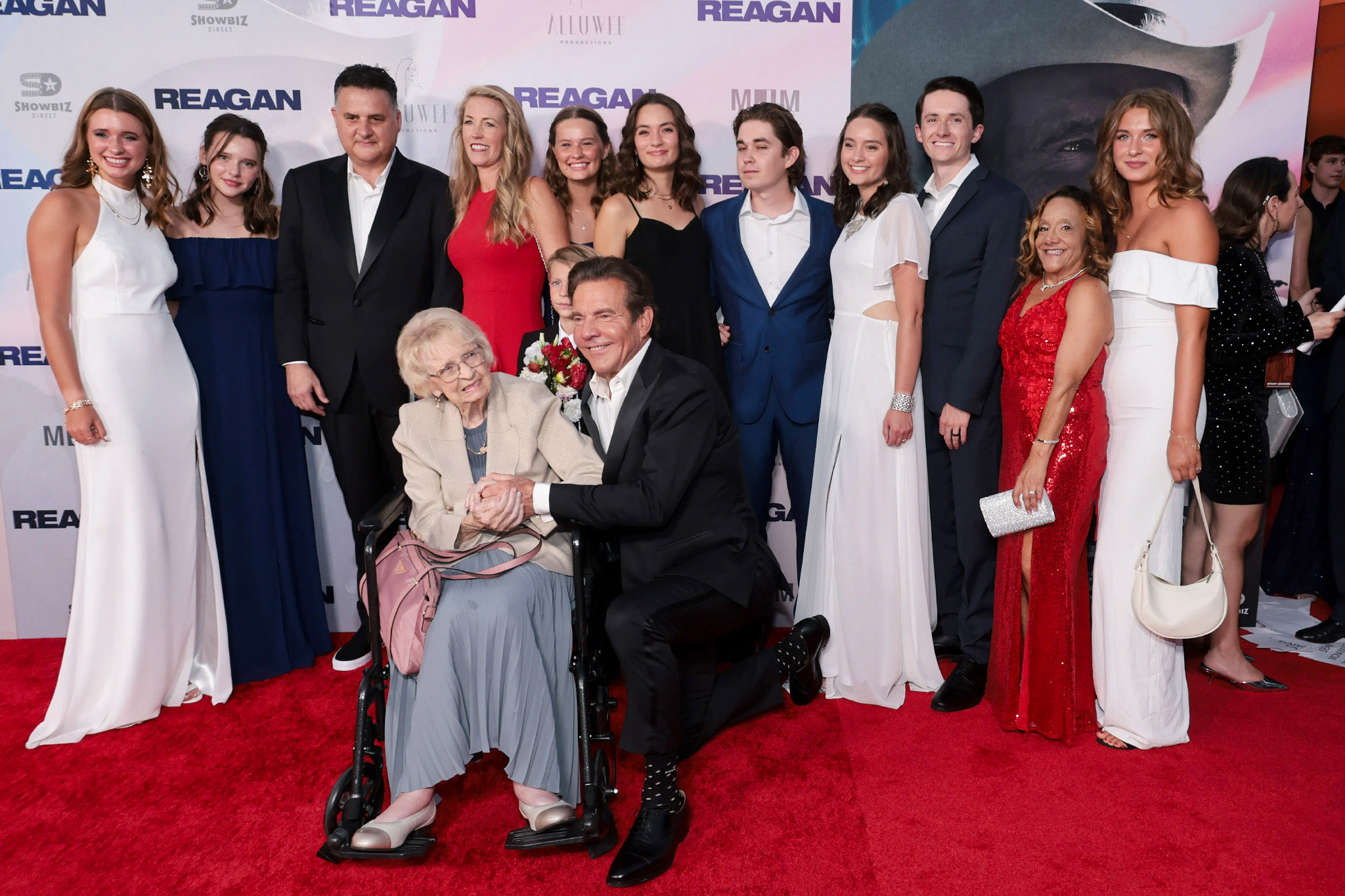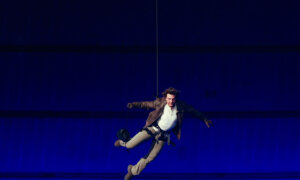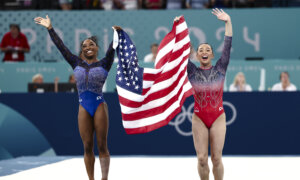LOS ANGELES—The stars came out in force at the Hollywood-area premiere of the biopic that honors the legacy of former President Ronald Reagan, offering insights that highlighted both the film’s historical importance and its relevance in today’s world. The Epoch Times asked attendees at the event about their perspectives on his legacy and the creative approaches to the film.
“Reagan” is a cinematic exploration of the extraordinary life of a man with humble beginnings in a small town, his meteoric rise as a Hollywood icon, and his ultimately becoming the 40th president of the United States. The film offers a unique perspective through the eyes of a former KGB agent, Viktor Petrovich, played by Jon Voight. Petrovich’s life becomes intertwined with Reagan’s when the latter first captures the attention of the Soviet Union.
With Dennis Quaid delivering a powerful performance, “Reagan” transcends the traditional biopic format. The film delves into Reagan’s personal journey, his unwavering determination, and the enduring love of his wife, Nancy, who stood by him every step of the way.
Coming out to support the film was Frances Fisher, known for her role in “Titanic,” who remarked on the timeliness of the film. “Some of these young people don’t even know who Ronald Reagan is,” she told The Epoch Times. “It’s so scary how kids are not learning from the past.”
Actor Nick Searcy emphasized Reagan’s warnings about the fragility of freedom. “He said that freedom is only a generation away from being lost,” he said.
Searcy also spoke on the influence of China in Hollywood. “I’ve seen it here in Hollywood and movies that I’ve either tried to get made or been involved in. They are definitely trying to affect the culture. And that’s how you change politics in a country, you brainwash the culture.”
He played the role of James Baker, the man who served as White House Chief of Staff and Secretary of the Treasury under Reagan, and later as Secretary of State under President George H. W. Bush.
Steve Hilton, political commentator and an ex-Brit, discussed Reagan’s partnership with British Prime Minister Margaret Thatcher.
“I think the point about Reagan was this partnership, in a way, [was] an accident,” he said. “You had two leaders both really committed to the principles of freedom and the importance of standing up to what they saw as the enemy of freedom in the world at that time, which was the Soviet Union and communism.”
“We need a strong leader, and we need a strong leader to stand up for freedom,” he added.
“He was an amazing president. He changed a lot of things around in this country, he really improved the economy, he basically won the Cold War without firing a shot. I’ve always been a huge fan of Reagan. I have some collectible stuff from Reagan too.”
Rick Harrison of “Pawn Stars” fame reminisced about Reagan as the first president he voted for. Harrison revealed that he had a small part in the film that ultimately ended up on the cutting room floor.
“I had to lose 15 pounds,” David Henrie shared of his preparation to bring a young Ronald Reagan to life. “I just studied as much early footage as I could of him so I could see how he spoke, the patterns in his voice, how he pronounced certain letters, and I just did as much research as I could.”
He noted the challenge of playing Reagan due to the scarcity of footage from his early life.
“One of the things that impressed me the most studying tape on Ronald Reagan is his political person and his personal person, they didn’t seem divided. It seemed like he was always himself,” Henrie said.
Mike Curb, former Lieutenant Governor of California and co-chairman of Reagan’s 1980 presidential campaign, said his memories of the president give him hope for the future.
“I hope we find another Ronald Reagan at some point,” he said. “All my friends, whether they are Democrats or Republicans, look back at Ronald Reagan as the good old days.” He urged more people to get involved and bring back strong values and civility.
Penelope Ann Miller, who portrays Nancy Reagan, reflected on the former first lady’s role.
She highlighted Nancy Reagan as one of the first presidential spouses to step out from behind her husband’s shadow and launch a high-profile campaign with her “Just Say No” initiative to combat drug abuse.
“Being in that position, you know you’re a public figure and you have a platform,” Miller told The Epoch Times. “I think she knew it was really important that she was able to put her beliefs out there and help the country with problems they were having. One of the big problems at the time and still today is obviously the drug problem that we have in our country.”
“I think she knew she had a purpose as well, and it wasn’t just about supporting her husband, which she did incredibly,” she said.

Dennis Quaid and Penelope Ann Miller attend the premiere of "Reagan" in Hollywood, Calif., on Aug. 20, 2024. (Valerie Macon/AFP via Getty Images)
Behind the Scenes:
Cinematographer Christian Sebalt opened up about the visual journey of the film, explaining how they developed “about seven different looks” to capture each decade from the 1920s to the 1990s. He also stressed the importance of authenticity.
“We shot in the Air Force One that [Reagan] was in, we shot in the Marine One that he was in, we shot at his and Nancy’s ranch in Santa Barbara where they lived,” he said.
Director Sean McNamara emphasized the film’s commitment to historical accuracy. “We did research, we read books, we looked at footage, and we just followed it and told the story from what we know,” he told The Epoch Times. “Only the really real things went in, either that we had proof of, or it was written about, or somebody spoke about.”
He also expressed his hope that the film would resonate with people across the political spectrum. “Reagan was a Republican, but he used to be a Democrat,” he said. “I’m a registered Democrat.”

Sean McNamara attends the premiere of "Reagan" in Hollywood, Calif., on Aug. 20, 2024. (Valerie Macon/AFP via Getty Images)
Screenwriter Howard Klausner discussed the challenge of capturing Reagan’s larger-than-life persona.
“He was the 20th Century, he lived the 20th Century,” Klausner said. He hopes audiences leave with “a sense of possibility that we really can get along with each other, even when we don’t agree with each other. That was a different time.”
Reflecting on how social media might have influenced Reagan’s legacy, he said, “I still think he would have won the battle that he won, ‘Mr. Gorbachev, tear down this wall.’”









